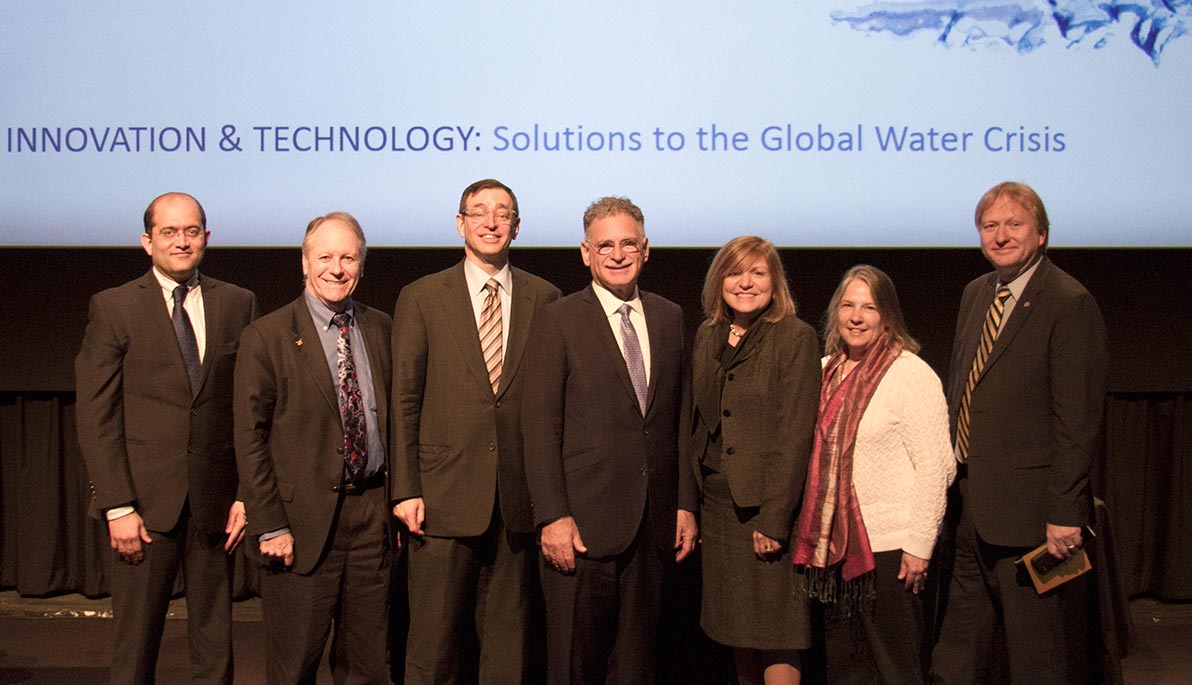News
NYIT Hosts Forum to Address a Global Crisis
February 8, 2016
Imagine a world where every individual on our planet has access to clean water.
NYIT explored that possibility on Feb. 1 at the forum, "Innovation and Technology: Solutions to the Global Water Crisis," at NYIT Auditorium on Broadway in Manhattan.
NYIT President Edward Guiliano, Ph.D., set the tone for the event, highlighting alarming data from the Global Risks Report at the World Economic Forum in Davos, Switzerland. The report indicates the top risk facing the interconnected world landscape in the upcoming decade is the water crisis. As our global population grows, so does the need for greater access to potable water sources.
"More than half the world's population now lives in cities, and those cities don't have the infrastructure to handle fresh water and wastewater," Guiliano said.
In his remarks, he cited examples of societies struggling with this clean water shortage: In India, hospitals cannot sterilize medical instruments, while in China, the South-North Water Transfer Project (the most expensive engineering project in history at $80 billion) aims to divert water to northern regions that include Beijing, home to 22 million people.
"Today's global challenges are serious and interlinked, so one-dimensional approaches won't work," Guiliano added. "We need holistic, transdisciplinary, and cross-cultural ideas."
Seth Siegel, activist, entrepreneur, and author of Let There Be Water: Israel's Solution for a Water-Starved World, echoed Guiliano's comments in his keynote address. He discussed how engineering and technology helped Israel—a country that is 60 percent desert—become a water superpower. The country not only developed new ways of incorporating water into its agriculture and economy, but also provided clean water to neighboring countries.
"There was no silver bullet that solved Israel's water problems," Siegel said. He also added that when it comes to solving global water shortages, "There is no technology too small or too irrelevant to consider."
Nada Anid, Ph.D., dean of NYIT School of Engineering and Computing Sciences, presented the forum's opening remarks and moderated a panel of water experts. They included:
- William J. Cooper, Ph.D., program director, Environmental Engineering Program, Division of Chemical, Bioengineering, Environmental, and Transport Systems at the National Science Foundation
- Kimberly J. Ogden, Ph.D., professor in the Department of Chemical and Environmental Engineering at the University of Arizona
- Danny Reible, Ph.D., Donovan Maddox Distinguished Engineering Chair at Texas Tech University
Topics included the recent water crisis in Flint, Mich. "The people who were making decisions were not asking the right questions of the right people," Cooper said. He has recommended additional investigations on behalf of the National Science Foundation to ascertain causes behind the lead contamination in Flint's water supply and its possible link to a deadly outbreak of Legionnaire's disease.
Panelists also discussed opportunities for conserving and reusing water; economic and market factors that drive the cost of providing clean water; and how tech developers and governments can provide solutions to deliver clean water solutions to the 1.2 billion people who lack this basic necessity.
Congressman Steve Israel of New York's Third District spoke of how global warming and its impact on clean water will affect billions worldwide—and why it's crucial for universities to serve as hubs of innovation and collaboration for scientists, policy makers, and entrepreneurs.
"It's important that we rely on institutions like NYIT," added Israel.
Vatsal Bhatt, Ph.D., U.S. Department of State's secretariat for the U.S.-China Eco Partnership and senior energy policy advisor for Brookhaven National Lab, also emphasized the need for proactive partnerships in addressing this multinational problem. He concluded the event with a recap of the solutions and ideas presented by the experts.





